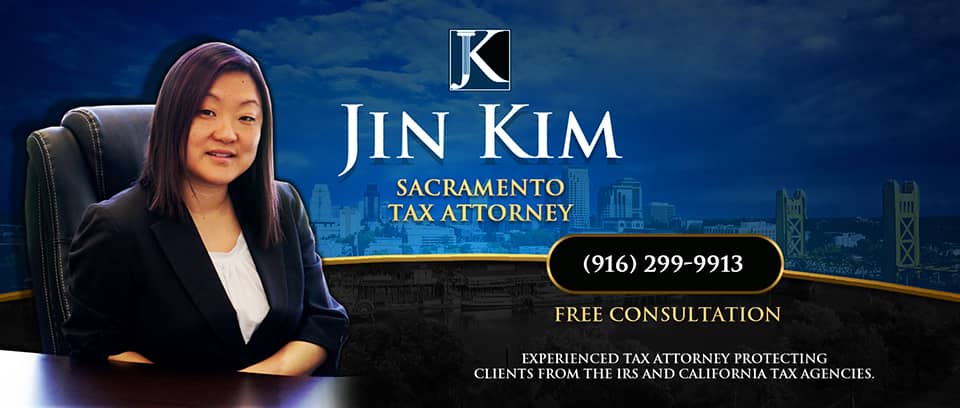Tax Audit Attorney

Free Consultation
(916) 299-9913
Mon – Fri
8 AM – 6 PM
Tax audits are one of the most serious financial threats facing individuals and businesses. Few taxpayers can afford thousands of dollars in assessed taxes, interest, and penalties, so it’s important to put an experienced audit defense attorney on your side. Tax attorney Jin Kim represents clients under audit by the IRS, FTB, CDTFA, and other tax agencies. To schedule a free consultation with our experienced tax attorney, call the Law Office of Jin Kim at (916) 299-9913.
Audit Notice
If you’ve been selected for an audit the IRS will notify you by U.S. mail – not by telephone or email. Accordingly, be wary of any emails stating you’ve been selected for an audit; the IRS never sends an audit notice through email. The same goes for telephone calls or texts. Any calls, emails, or texts concerning notice of an IRS audit are probably tax scams or identity theft schemes. An initial audit notice is always sent through the mail, although subsequent interactions with your examiner may be done by phone as well.
Audit vs. Examination
Before we get to the heart of the subject, let’s discuss some important terms first. The most common term for an audit is, of course, an “audit.” However, this isn’t the term used by the IRS. Rather, the IRS prefers the term “examination” even though taxpayers use the term “audit.” IRS auditors are in fact called examiners. Throughout tax literature, you may see the terms ‘audit’ and ‘examination’ used interchangeably, as well as ‘auditor’ and ‘examiner’. They both refer to the same thing. While the audit may not be the preferred term by the IRS, it’s the term most people are familiar with.
Statute of Limitations
Once you receive your tax audit notice, you must identify the relevant pieces of information. The two most important pieces of information contained in your audit are (1) the kind of audit you’ve been selected for and (2) the years for which you’re being audited. At this point, it’s best to familiarize yourself with the so-called ‘three years rule’. This means that the IRS can no longer audit a tax year if three years have elapsed from the date of filing that year’s tax return. There are certain exceptions to this rule, such as when the IRS suspects the taxpayer committed fraud or when the taxpayer did not file a return. Accordingly, you should always seek legal advice from a tax attorney to identify the applicable statute of limitations for your IRS audit. Nevertheless, if you notice that you’re being audited for a year that goes beyond the three-year rule, and it doesn’t fall under any of the exceptions, then you should bring this information to the tax attorney’s attention during a free consultation.
Types of Tax Audits
As mentioned above, your notice will tell you what kind of audit you’ve been selected for. There are three types of audits: correspondence audit, office audit, and field audit. In general, correspondence audits are the most frequent type of audit and the least serious. Office audits and field audits are more involved and often require the presence of legal representation.
1) Correspondence Audit
Correspondence audits are the most common of the three types of IRS audits. It’s estimated that out of a hundred taxpayers selected for an audit, around seventy to seventy-five people get chosen for a correspondence audit. Correspondence audits are done through the mail. If you’ve been selected for one, there’s no need to go to an office and meet an auditor face-to-face. The correspondence audit method is preferred when the issues involved aren’t too complex or the amounts involved aren’t too hefty. For this reason, correspondence audits are often considered the easiest among the 3 types of IRS audits.
Send Copies, Not Originals
The most likely scenario during a correspondence audit is that you’ll be asked to provide documentation. When sending your documents, it’s best to send photocopies rather than originals – the IRS doesn’t mind either way, but chances are you’ll never see your document again, so it’s best to send a copy instead. While a correspondence audit may be done mostly by U.S. mail, this doesn’t preclude you from picking up the phone and calling the IRS if you have questions. Most of the time the phone number of the agent assigned to you can be found in the initial notice. If in the end you’re not satisfied by the result of your correspondence audit, you have the option of asking to have an office audit. This might seem risky, but many correspondence audits which are turned into office audits may get closed without any additional tax liability.
2) Office Audit
If you’ve been selected for an office audit this means you’ll go to an IRS office and meet with an examiner face-to-face. This is more involved than a correspondence audit, so the stakes might be higher. The idea of meeting an examiner face-to-face is nerve-wracking, but you can always take steps to make the process easier. One way to make the process easier is to bring your tax attorney to the office audit. After all, it’s your right to have an attorney present during your office audit and interviews with the IRS.
Delaying Your Interview
Your initial notice for an office audit will not contain a schedule for your audit, and that’s because it’s up to you to set the meeting. According to the Taxpayer Bill of Rights, it’s your right to schedule your office interview at a time that’s convenient for both you and the IRS, so don’t feel pressured to bend over backward to accommodate your examiner. In fact, some tax professionals suggest strategically delaying your audit by scheduling your interview as far out as possible, having your newly retained attorney postpone the interview again. As IRS examiners are under pressure to close cases the logic behind this tactic is that the examiner will have an incentive to close your case and move onto easier targets.
Polite & Cooperative, But Protect Yourself
Once you’re in the office, you should be polite to the IRS examiner, but not too helpful. Hostility can, and often does, backfire. Rather than meet the examiner with hostility, be courteous and professional. Your attorney should be present and likewise professional. If the examiner requests documents that exceed the scope of your audit, don’t take offense; have your tax attorney present to constrain the scope of your audit and ensure that the documents provided match that scope.
An IRS examiner is trained to observe your behavior and to use it against you. You might notice that there are long stretches of silence during your audit. The purpose of this is to make you feel uncomfortable and blurt out things in an effort to have you admit wrongdoing. Don’t take the bait. Don’t make any more conversation than you have to. If you don’t know the answer to the question, admission of ignorance can be better than manufacturing information.
A common technique that may be employed by the examiner is to ask about a particular year or detail that isn’t included in the original notice. If you answer these questions you risk throwing open other years which are not included in the notice or which are beyond the three-year rule. If the IRS examiner tries to elicit this information from you, answer them gently but firmly by stating that the information isn’t relevant to the returns being audited. A simple “I have no idea” also works well for questions like this.
Speaking To The Supervisor
What do you do if the IRS examiner is rude or against you from the outset? The answer is that there isn’t really much to do. Some tax professionals suggest asking to see their supervisor and reporting their behavior. After all, according to the Taxpayer Bill of Rights, taxpayers have the right quality service; that is, to receive prompt & courteous assistance from the IRS and speak to a supervisor about inadequate service. This might work in some instances and you might get assigned a new auditor, but there’s no assurance that it will always work. I suggest only using this in the worst-case scenario.
Pro Tip – as should be apparent from the information on this page – it’s always helpful to have an experienced tax attorney present during your audit. The attorney is better equipped to deal with difficult auditors and requests for information beyond the scope of your audit. If you’ve received notice of an office audit, it’s highly advisable to retain a tax attorney and have them present during your interview.
3) Field Audit
During a field audit, the roles are reversed – it’s the IRS that will come knocking on your door instead of you coming to see them. The purpose, however, remains the same. Field audits are often the most stressful of the three types of audits. It’s typically reserved for large taxpayers such as businesses, corporations, partnerships, entities, and trusts.
Field Audit vs. Other Types
There are a few key differences with field audits. For one, the IRS isn’t really limited to auditing the tax returns stated in the notice – most of your tax returns will be fair game. The IRS will also try to interview other people in addition to the owner or responsible officer. Employees and even customers may be interviewed to get the full picture of the businesses’ finances and identify areas of underreporting. In order to minimize risk, you can set the date for your field audit during a time when you know that people will be out of the office. That way, you can control the narrative and prevent the auditor from talking to other people.
Unreported Income & Inflated Deductions
A field auditor mainly looks for two things: unreported income and personal expenses masked as business deductions. For this reason, the auditor may ask customers about your business to identify whether you’re really earning the amount you’ve reported to the IRS. Conversations with employees during a business audit may lead to similar discoveries; for example, a personal car deducted as a business vehicle.
Alternative Location
If you’re a small business owner, you can request to meet at the IRS office or your attorney’s office instead of your business if that location would effectively shut down your operations. You can hire a tax lawyer specifically for this purpose; a tax professional can request for the audit to be performed at their office rather than the taxpayer’s business.
Even if the IRS agrees to meet at the office of your lawyer, you still can’t prevent them from observing your business premises. As mentioned before, the IRS assigns well-trained agents for field audits and they will be on the lookout for anything that might cause suspicion. Photos of your expensive vacation, for example, can cause them to believe that you’re under-reporting taxable income. For instance, they may want to see the equipment you’ve claimed as business deductions. What you can do is to remove anything ostentatious that might cause suspicion in the IRS auditor’s mind and make sure that you can account for the business deductions you’ve claimed.
Don’t let the examiner tour the premises on their own. A casual remark from an employee can be detrimental, and some employees may welcome the opportunity to complicate your audit. Stay close to the auditor while they’re visiting your business.
- What is the Trust Fund Recovery Penalty? - August 25, 2022
- CDTFA Notice of Levy - August 8, 2022
- The Statute of Limitations on Deficiency Assessments - June 2, 2022
